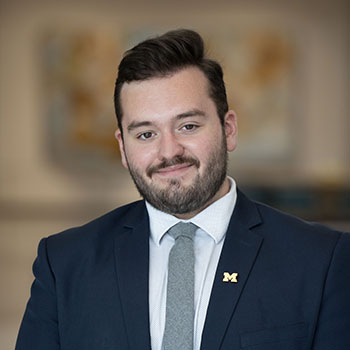
Funding a new transportation revolution: Liu congressional testimony
Professor Henry Liu addresses House committee on the need for a national surface transportation research agenda.

Professor Henry Liu addresses House committee on the need for a national surface transportation research agenda.
In the 1910s, Ford’s Model-T cars changed our conception of time and space. In the 1950s, the construction of interstate highway systems enabled travel by car over longer distances. And today we are facing a third wave of the transportation revolution with connected and automated vehicle technologies.
University Transportation Centers (UTC) funded through the FAST Act are critical to U.S. leadership in connected and automated transportation research, education, training, and deployment, Michigan Engineering researcher Henry Liu told U.S. representatives yesterday. (Watch a video of the testimony.)
Liu, professor of civil and environmental engineering, research professor at the University of Michigan Transportation Research Institute (UMTRI), and director of the Center for Connected and Automated Transportation (CCAT), testified before the House Committee on Science, Space, and Technology, Subcommittee on Research and Technology. He recommended improvements to the UTC program, of which CCAT is a part, and discussed the needs and challenges for a national surface transportation research agenda.
“In my role I am fully aware of the U.S. leadership in the evolution of transportation and mobility,” Liu wrote in his submitted testimony. “However, without increased funding – that advantage is ours to lose.”
Transportation is integral to society, but there are increasing concerns with the existing transportation system in the form of fatalities/injuries, congestion, and pollution.
Liu’s research has been focused on transportation systems modeling and control with emphasis on the development of connected and automated vehicle (CAV) applications. CAV technologies have the potential to substantially improve traffic safety and reduce traffic congestion, fuel consumption and emissions.
Our surface transportation system is becoming a complex social cyber-physical system that deserves extensive research.
Henry Liu
However, a transportation revolution of this scale must be backed by substantial research.
“Our surface transportation system is becoming a complex social cyber-physical system that deserves extensive research involving not only scientists and engineers but also social, legal, and political experts,” Liu said.
UTCs are critical to this research effort.
“UTCs are where transportation innovation begins, and it is where we are training a transportation workforce for the 21st century,” said Liu. “In order to ensure the U.S. leadership in this wave of transportation revolution, it is more important than ever for Congress to reauthorize the UTC program with increased funding.”
Liu recommended that the UTC program be fully reauthorized at no less than $150 million per year. He outlined three areas of focus for a much-needed national transportation research agenda:
CCAT was established at the University of Michigan in 2016.

Marketing Communications Specialist
Department of Civil and Environmental Engineering